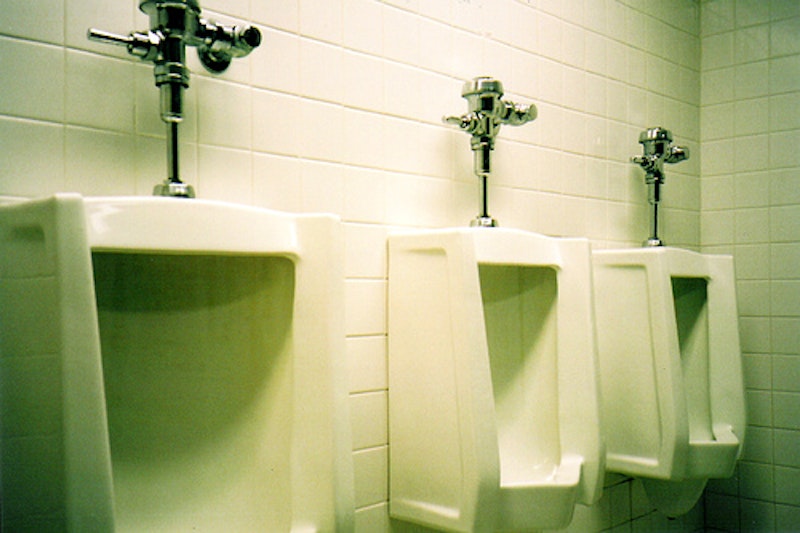I've never been able to comprehend why Americans works as hard as we do. I don't understand the importance or the appeal of the work friend. An air of fakeness scuttles about that fraudulent relationship. Those people feel it necessary to impart wisdom unto you: "It's who you know," they say convincing only themselves. After a year of turmoil in the world outside the office, I notice a insularity in the white collar day-to-day. A status quo that dares not be disturbed—except in the men's restroom. An all-out, extremely bizarre partisan battle has taken root in the privacy of the bathroom that offers an opportunity for a real, albeit anonymous, debate to ensue.
Anonymous is the key word. In mid-recession corporate culture, fitting in has become the ultimate goal, providing security to our means of life but stifling the opinions and personalities that make us unique. Misusing company time by chatting with an office buddy pulls down the ever shrinking bottom line, but looking busy at least hides the retraction. If coming off as a loafer did not provoke your manager to sack you, then voicing your political inclination certainly would separate you from the hovering medium.
Our increasing banality at work just seems like a safe play in uncertain times, far from the good ol' days when a rowdy bunch of eclectic characters sorted out some differences for the greater good of their work, company and themselves. In fact, I am almost certain that probably never existed, but the growing bundle of articles that I find each day in the restroom reminds me of greater tragedies than that printer on the third floor that always jams and really was never designed to handle the output of a medium- to large-sized office.
I noticed the trend a few weeks ago. I found a print-out of an article off foxnews.com maintaining the assertion that budgetary cuts to Medicare would vastly limit the access to care for seniors, restrict their choice in physician and ultimately prevent them from accessing life saving treatments. I read it. Laughed a bit and went on my way. The next afternoon another person that used that bathroom offered up an apparent rebuttal stapled to the original foxnews article. The second article cited the historic flip-flop of the GOP's stance on Medicare and its contribution to rapidly rising healthcare cost that contribute to economic instability.
The great bathroom healthcare debate chugged on, enveloping the best opinions on both sides of the government-run public option and the number of deaths due to lack of insurance or inefficient insurance. The arguments rebutted each other without a word spoken, and the characters made their points without stir or conflict or fear of recrimination. I noticed an increased traffic to that bathroom during the following days and weeks. We reached a point were you could see curiosity about the office. It went unstated, but I wondered how absurdly PC my 55-year-old manager acted around our Centers for Medicare and Medicaid clients versus his true desire to either burn the place to the ground or open its doors to the public. This was the first time I cared about his struggle to maintain his illusion regardless of what side of the aisle I would find him on.
The desire to get the debate going must have been in the halls and cubicles for months. But the argument returned to the bitter partisan lines it grew from: Tea party blog posts and Marxian passages found their way into the pages.
And then, most recently, a print-out ofyesterday's Rundown that declared the "public option is really, truly dead," with the inscription "Fuck Yea!" sharpied across the banner.
How did I feel? Eh, a bit cuckolded at first. Disappointed and cheated at the sorry excuse for Oxford cloth graffitti. The very invisibility that allowed the birth of the great bathroom healthcare debate manifesto enabled the fatal choice of yesterday's idiot who destroyed it. What was the point of the thought and inspiration and escape that took place over the past couple weeks if the end result is return to the status quo for simply the sake of the status quo?
Now that the manifesto's been removed there'll be a void. Something to fill. David Foster Wallace wondered in The Atlantic whether a "certain baseline vulnerability" might actually be the cost of freedom, because the price of absolute safety would represent an affront to the very idea of being American. Not to glorify it, but in a way that stack of articles in the men's room gave us pause, a glimpse of what we were missing. If I didn't work so hard, I wouldn't be surprised if in a few days another thought experiment might crop up. But honestly, who has time for that?

